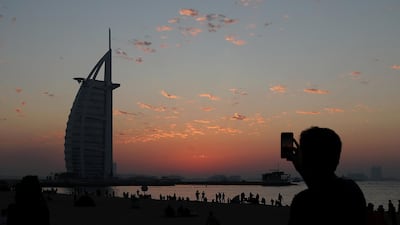Dubai has approved its 2019 budget, with higher revenues targets and continued spending as the emirate prepares to host global trade fair Expo 2020.
The Government has set the expenditures at Dh56.8 billion, slightly higher than the Dh56.6bn for 2018, which was 19.5 per cent higher from a year earlier, Dubai Media Office said on Tuesday.
The budget includes an allocation of Dh9.2bn, specifically for the infrastructure projects. Revenues are estimated to reach Dh51bn this year, up 1.2 per cent from the last year’s budget plans.
The Government has maintained the size of this year’s budget equal to its record 2018 budget.
“The Government maintained the same momentum as the previous year due to population growth and the benefits of hosting Expo 2020 and continuous development of the infrastructure and vision of the emirate 2021,” the media office said on Twitter.
The increase in the revenues follows “a series of economic stimulus decisions made by the emirate, which would reduce some fees and freeze the increase in any fee for three years”, it added.
_______________
Read more:
Stimulus to support UAE markets in 2019, analysts say
Eight investment trends to look out for in 2019
_______________
In June, Dubai and Abu Dhabi announced they were exempting companies from administrative fines for at least the rest of the year, as part of efforts to stimulate business growth. Dubai announced in April plans to implement new measures to help boost economic growth, attract new investments and cut the cost of doing business across sectors ranging from tourism to financial services.
The emirate slashed aviation and municipality fees in July. The Government scrapped 19 fees related to the aviation industry as it seeks to attract more than Dh1bn of foreign investments into the sector, state news agency Wam, reported at the time.
The UAE’s economy, the Arab world’s second-largest, which grew 0.8 per cent in 2017, mainly due to oil output and price declines, is set to accelerate this year thanks to a slew of government measures aimed at propelling the non-oil sector, which contributes to more than 70 per cent of the country’s gross domestic product, The National reported last month.
The Central Bank forecasts the economy will, as a result of the government reforms and measures, accelerate 4.2 per cent next year.
Meanwhile, Oman’s government expects to increase spending modestly this year, according to the state budget released yesterday.
Total spending will increase to 12.9bn Omani rials (Dh123.21bn) for the year – a rise of 400 million rials compared to 12.5bn rials announced in the 2018 budget.
The 2019 budget estimates a deficit of 2.8bn rials for this year, lower than 3bn rial deficit estimated in 2018. Sultan of Oman Qaboos bin Said issued a Royal Decree for the ratification of the general budget of the state for fiscal year 2019.
The sultanate’s 2019 budget, which is based on an oil price assumption of $58 per barrel, estimates total revenues of 10.1bn rials, Reuters said.
According to the government, around 86 per cent of the 2.8bn rial budget deficit will be financed through external and domestic borrowing while the remaining 14 per cent deficit will be covered through the withdrawal from reserves.
Oman reduced its budget deficit by more than 36 per cent to 2.04bn rials in the first 10 months of the year against a budget shortfall of 3.2bn rials for the same period of last year.
Before yesterday’s announcement, the government and public sector departments were urged to avoid increasing their budgets and focus on rationalising expenditure and rearranging priorities in line with the available financial resources, according to Bahrain’s GDN news agency.
The main focus of the general budget 2019 is to reduce the deficit and debt and rationalising public expenditure.
Before the announcement, the Ministry of Finance stressed the need to maintain basic priority areas for citizens – such as health, education, electricity, water and social security – and focus on diversifying the sources of income and increasing the contribution of non-oil revenues.

